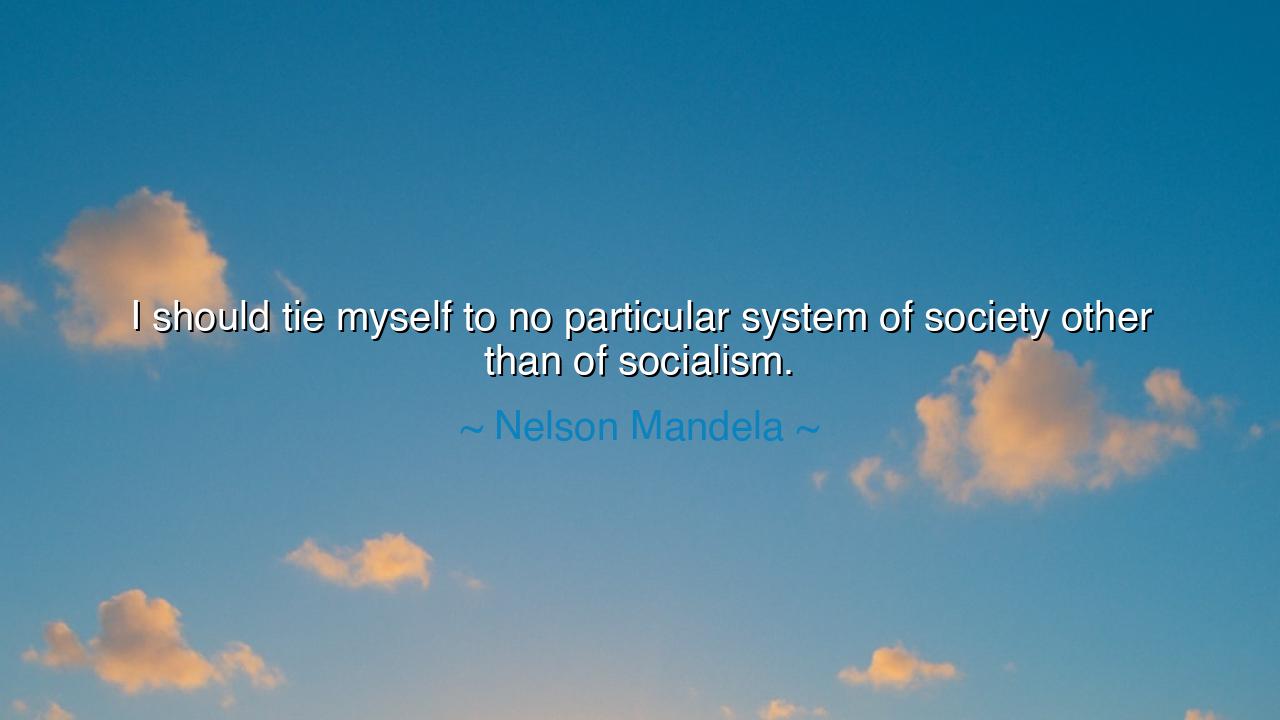
I should tie myself to no particular system of society other than






O children of the future, listen well to the words of one whose life was a beacon of sacrifice, struggle, and vision. Nelson Mandela, a man whose name is etched in the chronicles of human history, once declared: "I should tie myself to no particular system of society other than of socialism." These words, spoken by a leader who fought for freedom and justice, resonate deeply with the wisdom of the ancients—who understood that the ideals upon which a society is built must reflect the true needs of the people. Mandela’s declaration was not a rejection of society itself, but a call to align his very being with a system that sought to uplift and empower the oppressed.
The ancient philosophers—men like Plato and Aristotle—wrestled with the question of the ideal society. They spoke of systems of governance and ways in which a society could reach its fullest potential. Plato’s Republic envisioned a society governed by wisdom and reason, where the rulers were philosophers who understood the needs of the people. Aristotle, in his Politics, argued that the best society is one that promotes virtue and happiness for all its citizens. But, like Mandela, they understood that societies often fall short of these ideals. They recognized that societies could easily be corrupted by those who sought power for themselves, leaving the people to suffer under systems that favored the few over the many.
Mandela’s words must be understood in the context of the struggle he faced in his own time. He was not simply rejecting the systems that were available to him, but the very structure of a society that had oppressed his people for centuries. South Africa, under the brutal system of apartheid, was a society that was designed to keep black South Africans in a perpetual state of subjugation. In such a system, Mandela’s allegiance could not lie with the structures that were inherently unjust. Instead, he sought to tie himself to a system of society that fostered equality, unity, and justice—that of socialism. He knew that the freedom of his people could only be realized in a system that worked for the common good, where no one would be left behind.
Let us reflect, then, on the story of ancient Egypt, where the pharaohs ruled over a vast kingdom, and society was structured to support the power of the few. The laborers who built the great pyramids, those magnificent monuments to the might of the rulers, were not free. They were bound by a system that demanded their service for the benefit of those at the top. But even in the time of the pharaohs, there were voices that called for a fairer distribution of wealth, for a society that worked for all, not just for the powerful. Mandela’s pursuit of socialism was rooted in this ancient desire to create a society where freedom, equality, and justice were not privileges for the few, but rights for the many.
In his own time, Mandela saw the destructive forces of apartheid and the system of racial inequality that sought to divide people. He knew that no single individual could change such a society alone. He believed that it was not just the fight for individual freedom, but for the collective liberation of all people that mattered. Socialism, to Mandela, was not a mere political system—it was a philosophy of society built on shared responsibility, community, and solidarity. He understood that a just society could only exist when the system of governance recognized the dignity and rights of all people, regardless of their race, class, or background.
The lesson that Mandela teaches us is one of service and commitment to a higher cause—the cause of a society where freedom and justice are more than ideals, but realities for everyone. His words challenge us to ask: What system do we align ourselves with? Is it a system that exalts individual power and wealth, or one that builds a world where all people can thrive together, equally and harmoniously? In our own lives, we must remember that the systems we choose to support define the future we create. It is not enough to accept the world as it is; we must strive to create a society that reflects our highest values.
So, let us take this wisdom and move forward, for it is in our hands to shape the world we live in. Let us remember that no individual can carry the weight of change alone; it is the collective will of people, united in their efforts and their purpose, that brings about a just society. Like Mandela, we must not tie ourselves to systems that perpetuate injustice, but to those that uplift the weak, honor the dignity of every human being, and bring us together in the pursuit of the common good. The path to a better world lies not in the comfort of the status quo, but in the courageous vision to build a society where justice, equality, and solidarity reign.






AAdministratorAdministrator
Welcome, honored guests. Please leave a comment, we will respond soon